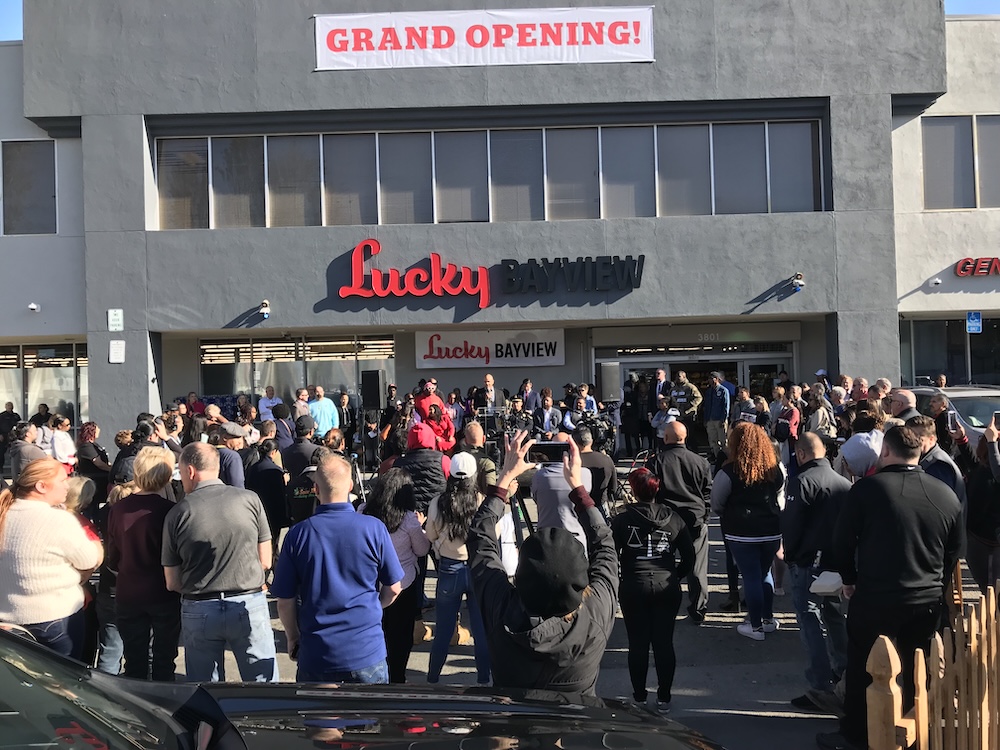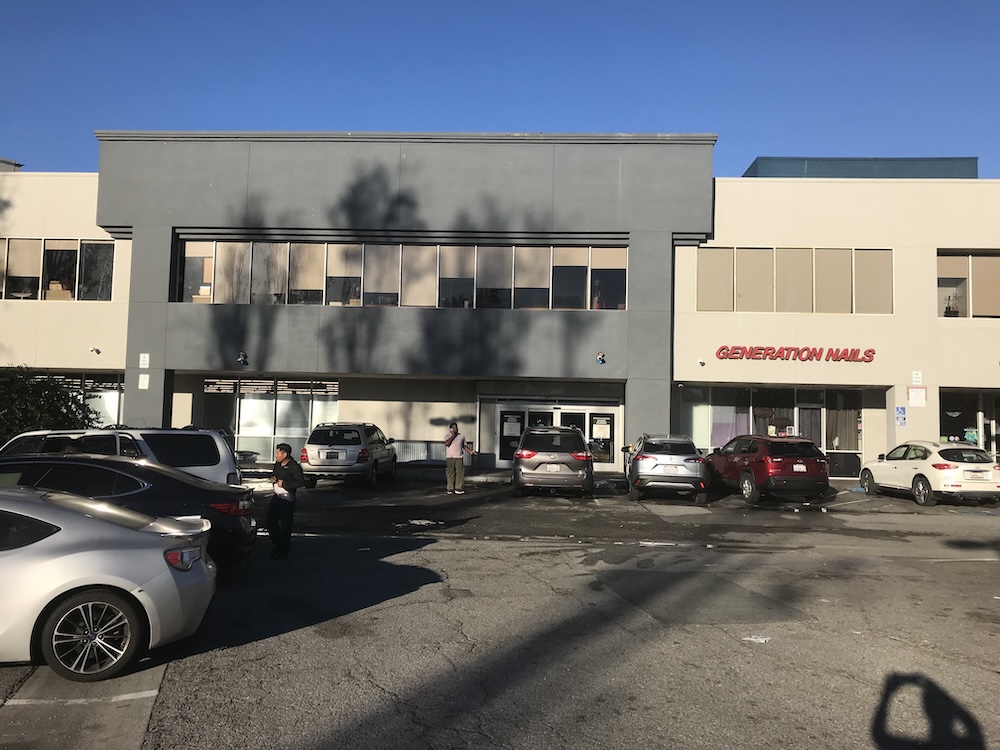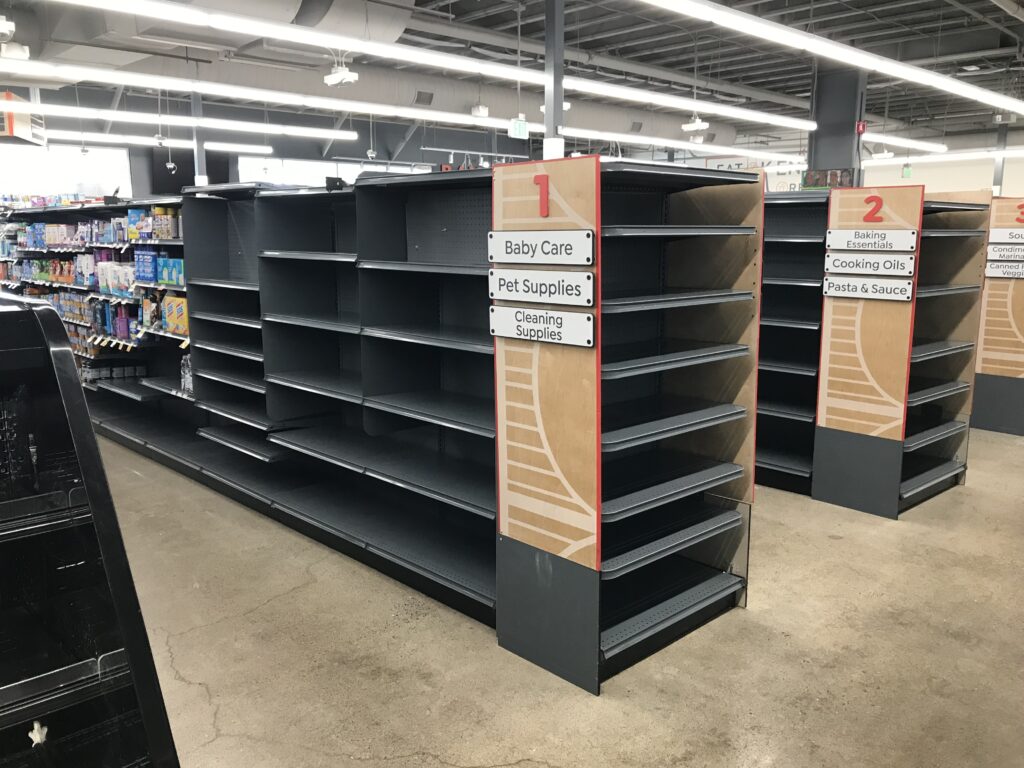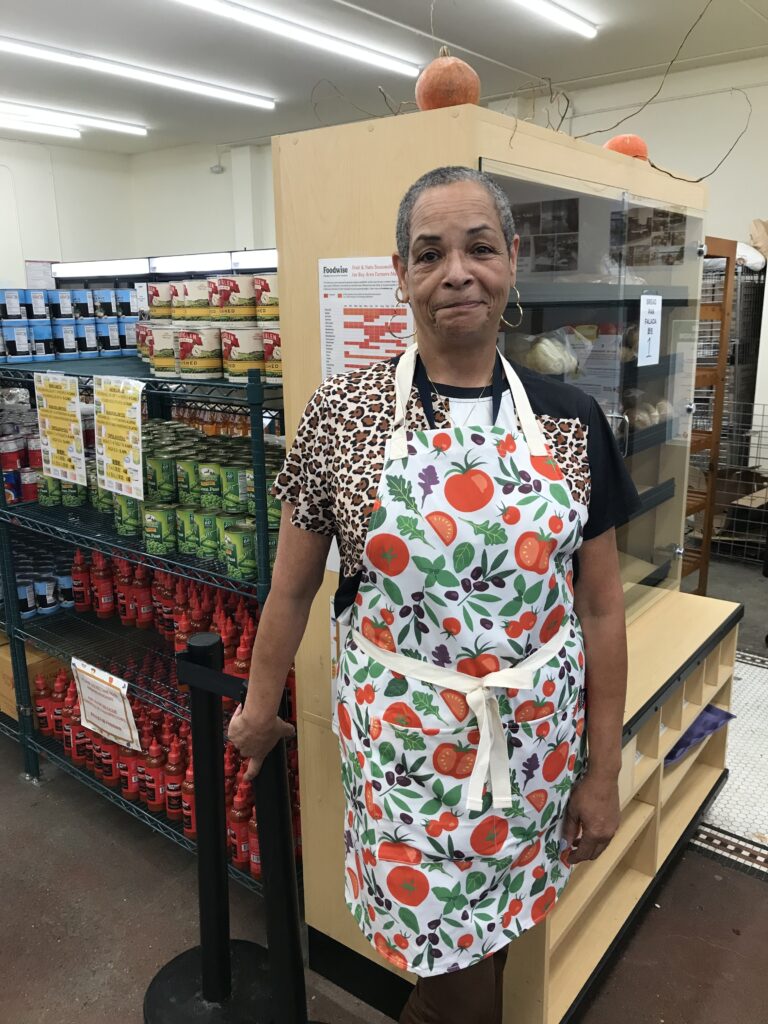Spirits ran high for Lucky Bayview’s grand opening on Oct. 26, 2022. A quaint picket fence corralled a semi-circle of local reporters, who jostled for camera position in front of a stage featuring Mayor London Breed, Supervisor Shamann Walton, and Francisco Police Captain David Moran.
“The opening of Lucky Bayview is a major step in improving food access and food security in what has historically been a food desert,” Breed announced, recalling the food desert of her childhood in the Fillmore. “This is really going to be a game-changer for Bayview Hunters Point.”

“This was a hard-fought battle for many years,” Walton said, noting that Walgreens left the same location in 2019 after 30 years and that the community had to fight against a cannabis dispensary taking its place.
Three years later, parent-company SaveMart announced Lucky Bayview would close on Nov. 1, the one-month notice catching San Francisco officials by surprise. The store’s “small footprint” model of 9,549 square feet shielded the corporation from San Francisco’s Neighborhood Grocery Protection Act, which requires grocery stores of 10,000 square feet to give the community six-month’s notice before leaving.
And then the November 1 closing date became more ominous: On top of losing a grocery store, Bayview residents, along with 42 million other Americans, would lose SNAP benefits.
“This store has been open for less than three years and its loss is another major blow to the Bayview community, which has long faced the challenges of being a food desert,” Walton said in a released statement.
SaveMart released a statement saying the decision was based on “the store not meeting the financial or operational expectations required for continued operation.” When asked to clarify “financial or operational expectations,” SaveMart declined further comment.
Three weeks before Lucky closed, Esther Juarez, a Bayview homeowner since 2003, clanged her grocery cart in line with other carts before waiting for her ride. For Juarez, how the store closure was handled stung as much as the closure itself.
“They didn’t give any reason,” Juarez said. And the promise that the locally-hired employees would find work at other Lucky stores didn’t sit easy with Juarez; failed promises from powerful interests have plagued the Bayview for generations, ranging from “certificates of preference” during Redevelopment to “completed” clean-ups of toxic sites.
“A lot of the employees were chosen from the Bayview district,” Juarez said. “That helped them get the contract, by hiring so many residents from this zip code.”
Karey Fenderson, Bayview resident since the 1990s, visited Lucky about three times a week since its grand opening. He shares Juarez’s feelings of being disrespected, especially since the closure came so close to the holidays. “The residents deserve an explanation and an apology,” Fenderson said. “Businesses come and go, but a grocery store is essential to a neighborhood.”
He said he understands the big picture problems of access to nutritious food within a food desert, i.e., distance can dictate decisions about diet. But he’d also like the rest of San Francisco to understand the daily inconveniences the Bayview has always had to deal with. “I can’t just say, ‘Damn, I need a bell pepper,’ and head over somewhere close by.”
Gary, who declined offering his last name, had to collect himself before speaking because the news of the closure hit him hard. “I’m Bayview, born and raised, since the ’80s, and it’s really sad that it comes to this all the time. Something good, and it gets closed out.”
Gary isn’t the first customer interviewed to suspect that shoplifting was a factor, although that wasn’t cited as the official reason for closure. (Walgreens cited theft for the 2019 closure.) Several customers said that high prices and a reliance on self-checkout machines were blind spots in the plan for a long-term grocery store in a high poverty area. Whatever the reasons for closure, Gary sees a result that he’s seen before.
“It’s one more thing that the Bayview loses. But it’s a bigger story than just the store.”

On October 28, four days before the Lucky closure, the Ruth Williams Opera House hosted an event explaining the bigger story behind the store’s closure.
“It was 1966 when the National Guard stormed Third Street, literally 50 feet away from where we are sitting, and they shot inside of this building after the police department murdered Matthew Peanut Johnson,” Theo Ellington recalled in his opening remarks of the screening and panel discussion of NOVA’s Critical Condition: Health in Black America. “I’m triggered—as you should be—given the threat coming from our federal government to send the National Guard into San Francisco.
“Today we’re seeing these same social ills hiding in plain sight, like toxic land and the closing of the grocery store up the street. They’re denying basic rights here in the best city in the world.”
“Many Black American communities today have less access to nutritional food, higher levels of air pollution and limited access to quality health care, with fewer primary health facilities and a dangerous shortage of doctors,” Ralph Bouquet, co-director of the film and the evening’s moderator, said.
The film (which includes appearances by the Bayview’s Arieann Harrison and Dr. Ahimsa Sumchai, as well as Oakland’s Margaret Gordon) showcases how the Bayview’s problems are an American problem, not just a San Francisco problem. “Nearly a quarter of all Black Americans in the US live near pollution in facilities or one of the nation’s 1800 toxic Superfund sites,” Bouquet said. “These are sites that, of course, are linked to higher rates of infant mortality, cancer, lung and heart disease.”

The NOVA documentary featured the 2021 closing of an Aldi grocery store in Chicago’s West Garfield Park, a food desert, with little warning due to “poor sales performance,” according to the corporation. “There’s over a half-million Chicagoans who live in poor neighborhoods where healthy food is not a given,” Elizabeth “Liz” Abunaw, founder of Forty Acres Fresh Market, says in the documentary.
“I don’t call them food deserts. I call it what it is. It’s food apartheid.”
During the Q and A session, Arieann Harrison pointed out the irony of the Bayview being a food desert: tons of fresh fruit and vegetables are delivered to SFMarket and pass through the Bayview every day. (Since 2016, SF Market’s Food Recovery Program has diverted food that would have ended up in the landfill to community nonprofits and service providers, recently marking 10 million pounds of recovered produce.)
“All the fresh vegetables come right through our neighborhood, and then it leaves our community,” Harrison said. Instead of putting a new grocery store in the floorspace of a drugstore, she recommended improving already established local stores like Supersave. “We need to have our own community market, and we need to build up the businesses that are already here, help them do more for our community.”
Three days before Lucky’s closure, a few blocks down on Third Street, the D10 Community Market was doing its part to insure that not all the fruits and vegetables leave the Bayview.
“We’re trying to get what our clients need closer to home and in an atmosphere that is more dignified, where they’re choosing what they’re going to bring home,” said Maggie Shugerman, director of the D10 Market, a bustling, interactive space that serves as a reminder that grocery stores are much more than just warehouses of food. They are integral community spaces, “watering holes,” as Shugerman said.
Shugerman said she is as unsure as anyone about the exact reasons why Lucky folded up shop. But if theft, possibly from an overreliance on a self-checkout system, was the reason, she wonders why closure became the best option. “If something clearly isn’t working, you try a new approach. You say, ‘We want to be successful here. How can we re-approach this?’ Instead of saying this isn’t working and we’re walking out on a month’s notice.”

Alexis Alexander, who volunteers at the D10 Market in addition to her work at Bayview’s Safe and Sound, has lived in the Bayview for 42 years and seen it all before. But there’s no sugarcoating Saturday, November 1.
“No food stamps, plus Lucky’s closure,” Alexander said, shaking her head. “This place (D10 Market) is a Godsend to many people in this neighborhood.”
“Lucky’s kind of duped us. We thought they were going to be here for us. But they did like everybody else. They came. They saw. They left.”
On Saturday, Nov. 1, 2025, the SNAP program floundered to a halt, later to be halfway resuscitated. Meanwhile, at the Bayview Plaza in San Francisco, the day comes and goes without any balloons, streamers or speeches for Lucky, which was locked up and emptied at least 40 minutes before its usual 5 pm closing time. The Lucky Bayview sign had been removed, revealing the faded lettering of what had come before: “Walgreens.”
No sign, however, of what would come next.






